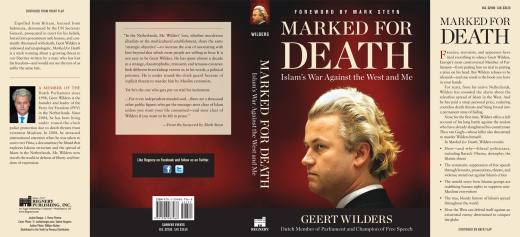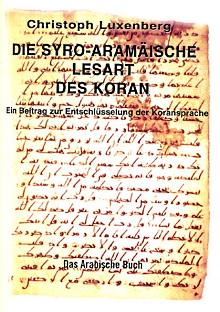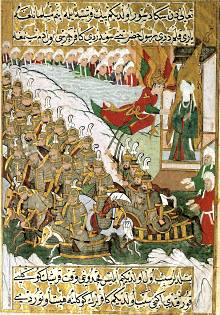Muhammad Manipulated The Koran
From the desk of Geert Wilders on Sun, 2012-04-29 09:35

My book about Islam (Marked for Death: Islam’s War Against the West and Me) is being launched in New York on Tuesday. It posits that the Koran is not a book that was written by Allah, but on the contrary, one that was written by Muhammad. That is the truth, but to Islam that is outright blasphemy.
Islam claims that the Koran was written down by Allah in person before the beginning of time. It was written in Arabic, says verse 20:113. The original copy of the book – the Umm al-Kitab, the “Mother of the Book”- lies on a golden table in heaven. Consequently the Koran is of a totally different order than the Jewish or Christian bibles, which were written down by prophets or apostles. The Koran was written directly by Allah himself.
According to Islam, Muhammad simply noted down what the archangel Gabriel read to him from Allah’s book. Whoever doubts that must fear for his life. That is why historic and linguistic research into the origin of the Koran are taboo.

In 1991, Suliman Bashear, a professor at the Palestinian university in Nablus, was thrown out of a second storey window by his students because he questioned the historic truth of the Koran. A Lebanese or Syrian linguist, whose identity is known to no-one and who writes under the pseudonym of Christoph Luxenberg, maintains that the Koran cannot have been written in Arabic but was written in the related Syro-Aramaic language. His life, too, is in danger, because Allah himself said that the Koran was written in Arabic. Whoever denies that commits blasphemy. When Newsweek published an article about Luxenberg’s theory some years ago it was promptly banned in a number of Islamic countries.

Yet the evidence that not Allah, but Muhammad is the author of the Koran is overwhelming. When one reads the Sira, the biography of Muhammad written by Ibn Ishaq in the eighth century, it is striking how Allah produced texts that catered directly for Muhammad’s political, sexual and covetous desires. One must be blind not to see that Muhammad was an opportunist who adapted texts as it suited him.
Take the example of the so-called Satanic Verses. In the early period of Islam Muhammad did not get much support in his home town of Mecca. His fellow citizens did not believe a word of what he told them about the so-called messages of Allah. As a consequence, Muhammad, who sought the support of the Meccans, allowed the Muslims to pray to Mecca’s main female deities. He said they were the daughters of Allah. They were perfect intercessors, said the Koran.
Later, when Muhammad quarreled with the Meccans, he revoked these verses, claiming that they had been inspired by the devil instead of by Gabriel. This story is in the Sira, but Muslims do not like to be reminded of it. Salman Rushie incurred a death sentence for his book The Satanic Verses. The Japanese translator of Rushdie’s book was murdered; two other translators and the Norwegian publisher of the book narrowly escaped the same fate.
As Muhammad failed to convince Mecca’s polytheists, he attempted to win the support of Jews and Christians in the city. This explains why Allah was friendly towards them in the early verses of the Koran. But when the Jews and the Christians refused to recognize Muhammad as God’s latest Prophet, the Koran began to threaten them with hell and damnation. New verses commanded the Muslims to wage war on them.
As a result, many Koranic verses contradict each other. Muslims have solved this problem with the abrogation concept: Later verses overrule earlier ones. This, too, is something they do not like to be reminded of. In a speech in Regensburg in 2006, Pope Benedict unwittingly pointed out that there is a difference between the tolerant verses of the early period, “when Muhammad was still powerless and under threat,” and the hostile verses of the later period. At once savages burned down churches in Islamic countries and murdered Catholics. The Pope quickly apologized.
Muhammad not only manipulated the Koran for political reasons. He also did it out of lust. When Muhammad desired the wife of his adopted son, he forced the latter to divorce her. Arab incest taboos, however, did not allow a man to marry the ex-wife of an adopted son. And behold, Allah produced a Koranic verse (33:37-38) ordering him to marry the woman so that “it should become legitimate for true believers to wed the wives of their adopted sons. Allah’s will must be done. No blame shall be attached to the Prophet for doing what is sanctioned for him by Allah.

Muhammad also manipulated the Koran to satisfy his greed for material things. After the raid on a Meccan trade caravan at Badr in March 624, Muhammad wanted to have all the spoils for himself. Lo and behold, there was Allah with a verse (8:1) stating “The spoils belong to Allah and the Apostle.”
All this aroused the suspicions of Muhammad’s scribe, the man who wrote down the prophet’s revelations. The scribe renounced Islam and ran away.
This, too, is something the adherents of Islam do not like being reminded of. However, that the Koran was not written by Allah in heaven is a fact. The Koran was made up by Muhammad as it suited him according to his opportunistic goals. We must confront Muslims with this truth. Because only the truth sets people free. And if the truth is that the Koran is not the word of Allah, it does not need to be taken literally.
Geert Wilders is a member of the Dutch Parliament and leader of the Party for Freedom. He is the author of the book “Marked for Death: Islam’s War Against the West and Me” (Regnery). This article was first published in Dutch at the Dagelijkse Standaard website.
Buy "Marked for Death - Islam's War Against the West and Me" from Amazon US or Amazon UK.

Manipulation
Submitted by traveller on Sun, 2012-04-29 11:58.
One more tidbit:
http://www.sunnewsnetwork.ca/video/featured/news/868018287001/investigating-the-origin-of-islam/1595652886001